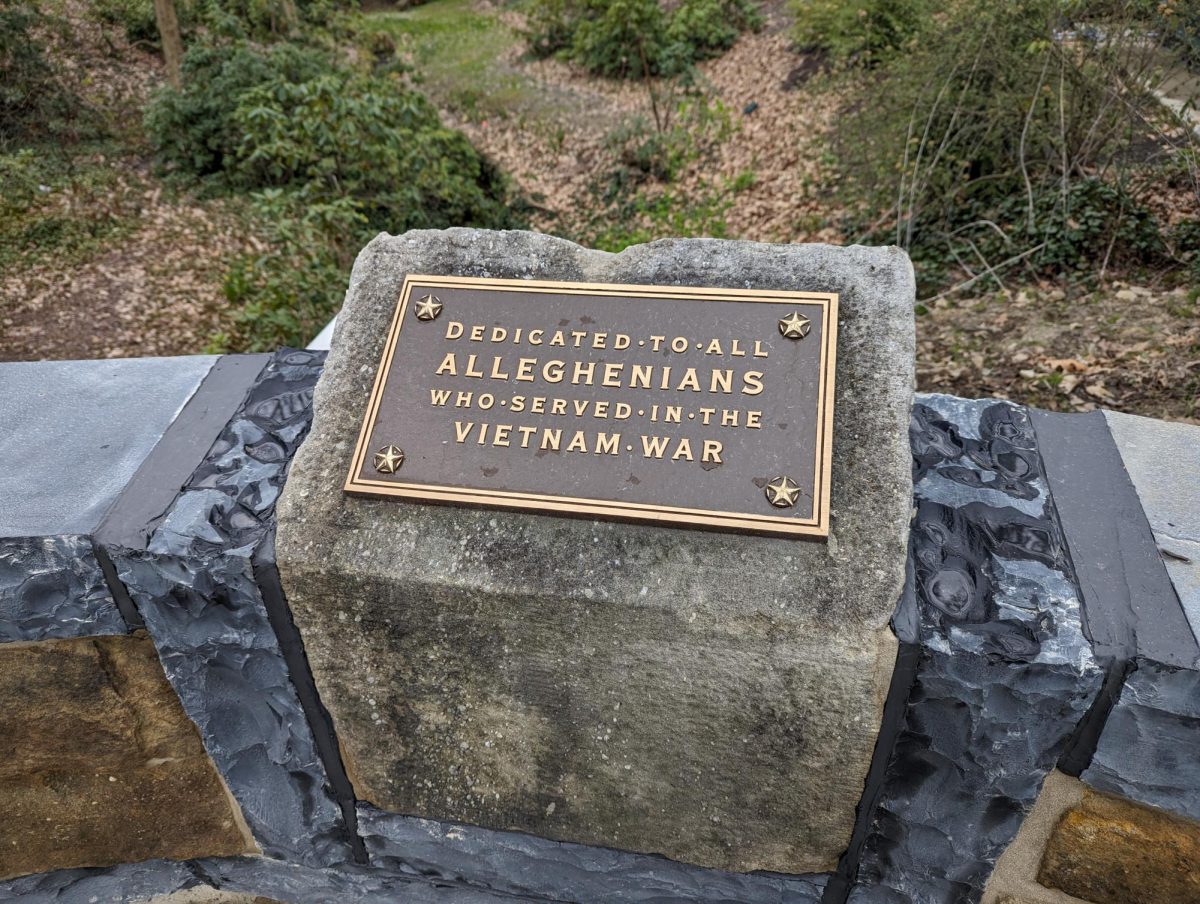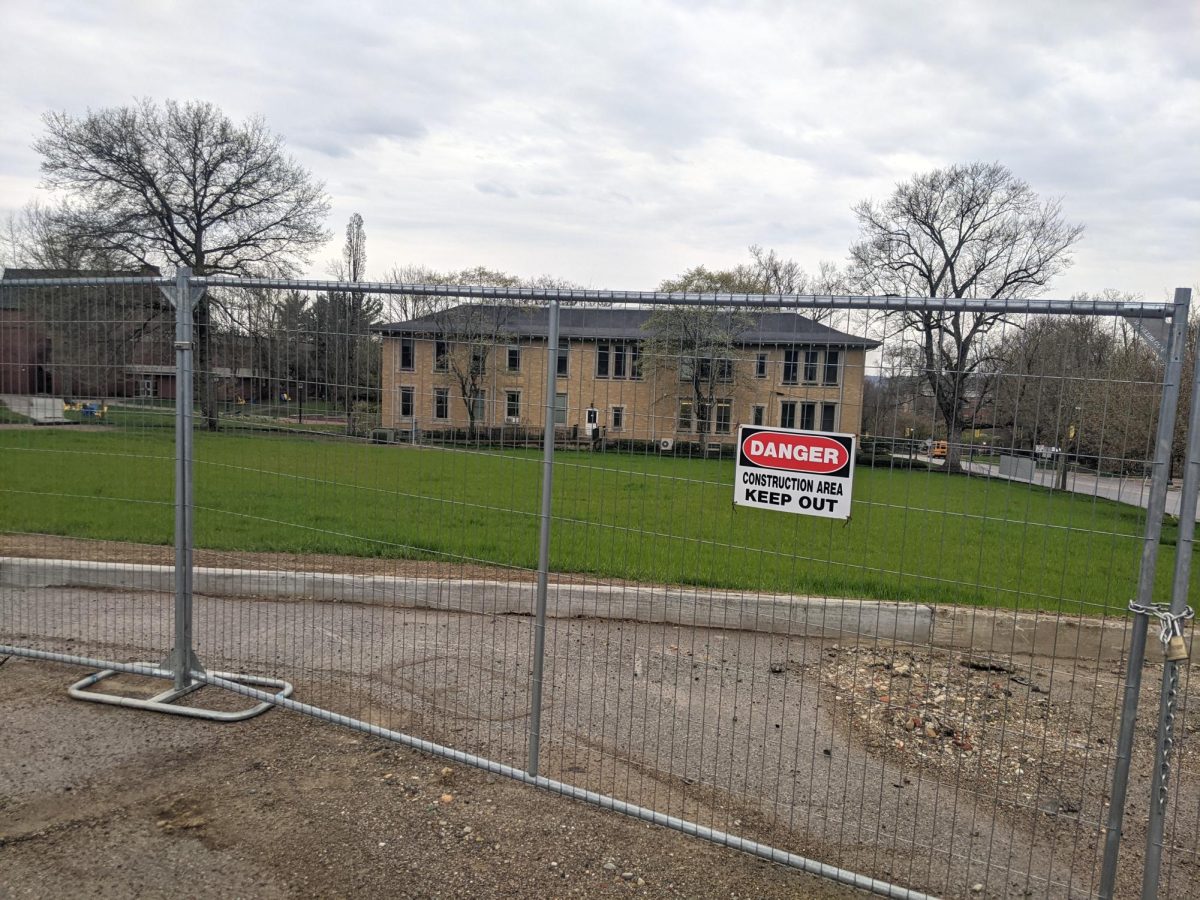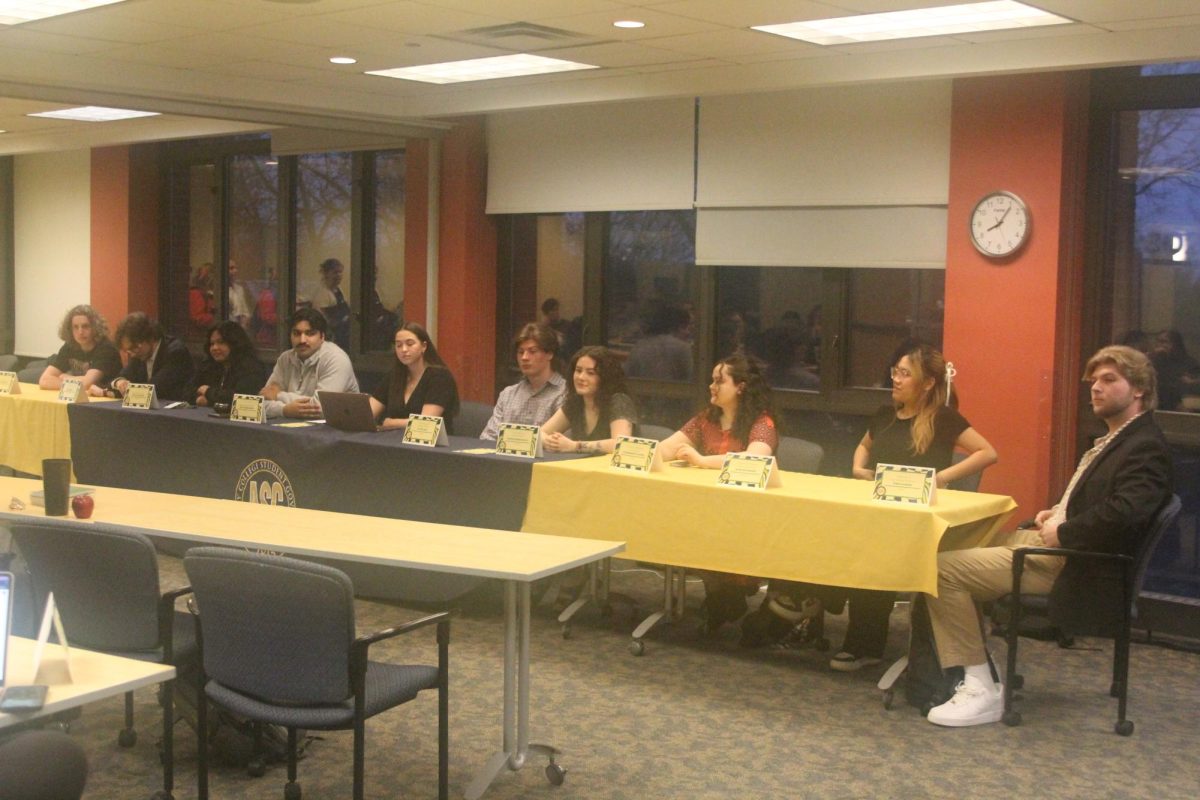A handful of tents, a litany of hand-painted cardboard signs, an outdoor tent shading a jumble of odds and ends — including a bullhorn — and groups of students sitting on blankets attracted passerby Diehl Edwards, ’14, to the Occupy Allegheny movement spread out across Bentley lawn.
“I just came over a few minutes ago to check it out. I’m not necessarily involved, except I sympathize with a lot of the things they’re trying to do and the things they’re trying to protest or advocate for,” Edwards said. “I had heard that interest in the movement petered off. I hadn’t heard anything for months and months and now this is the one-year anniversary, so everyone’s reminded again.”
Edwards turned to Aman Biswas, ’13.
“Is this Occupy movement is trying to address the concerns of the 99 percent movement in New York City or is it doing something for the college? Is it protesting the administration?” Edwards asked.
“It’s commemorating the Occupy movement, because today’s the first anniversary,” Biswas answered. “But the reason we chose Bentley is to make it clear that we’re not just doing it like, ‘Oh, fun and games.’ We mean business.”
The students gathered in front of Bentley were there to voice their opinions about a variety of different issues — from the tire incinerator to voter ID laws to campus diversity issues.
“No one’s really involved from an organizational side, but rather an individualist side…It’s a framework of expression,” Biswas added.
Some Occupiers sat on blankets amid the tents discussing issues of concern amongst themselves, while others chatted with any curious passerby.
“It was totally mellow,” Dean of Students Joe DiChristina said, describing his encounter with Occupy Allegheny early Monday morning. “I was coming through, getting ready for the day, and they were there, so I just stopped by while they were setting up tents. That’s all, and they gave me an update informing me about what they were doing. So it wasn’t anything spectacular.”
Cardboard sheets made by the Occupiers stood in the lawn, leaned against the tents, and strung across a clothesline adorned with an “I OCCUPY CUZ” sign conveyed a host of messages and sentiments.
“President Mullen has ignored my emails!” read one sign.
“Only 30% of non-white students graduate from Allegheny College in 6 years,” read another.
The Occupiers also wrote messages in chalk along Brooks Walk and campus buildings, including Bentley and Brooks.
“WE ARE WATCHING,” said one message written beside the entrance to Bentley. “Occupy is Sexy,” said another written next to Brooks’ doors.
DiChristina saw no problems with the Occupiers’ messages on buildings.
“It’s just people being passionate. I think the chalkings are still there. It’s fine. It’ll stay there for a little while and then it will be removed,” DiChristina said. “The comments were totally fine. They weren’t slanderous or anything like that. I don’t see it [as] problematic. I mean, eventually, they come down because three or four days later, [it’s] time to move on.”
President James Mullen agreed, expressing his support for students’ freedom of expression.
“I think we should be about the free expression on this campus,” Mullen said. “So I don’t in any way want to diminish students’ sense that they have a full opportunity to express their feelings and their sentiments.”
While noting that Bentley is seen as an iconic building on campus to be respected, Mullen also took into account the convictions of the occupying students.
“I think that there are places to express ourselves and I’d like to see it done there, but I think that again I think I’m respecting the passion that students felt,” he said.
Last October, however, DiChristina sent out a school-wide email discouraging students from writing personal and club messages on campus buildings.
“I request that when you put messages out to our campus you not place these on campus buildings,” the email read. “Using chalk on sidewalks or putting posters on approved bulletin boards is our method to notify the community.”
College Democrats’ President Nick Diana, ’13, stayed to register students to vote and express discontent with the direction of some college policies. He cautioned against assigning a single cause to the Occupy Allegheny movement, citing the wide variety of reasons concerned students came together to discuss issues, possible solutions, and ideas.
“It’s hard to talk about progress as a group, because the whole thing about the Occupy movement is that each person who comes to the Occupy movement has individual reasons for coming, and if you have individual reasons, then it implies you have individual goals,” Diana said. “Personally, I came here to register people to vote. And I did that. So I accomplished something.”
Concerns about the college’s environmental policy and diversity on campus motivated Allegheny Student Government’s Director of sustainability and environmental services Brian Anderson, ’13, to help organize and participate in the Occupy movement. When examining diversity and issues of privilege on campus, Anderson found that the problems began with none other than himself.
“Me, to be honest,” said Anderson. “I would say white males who come from a wealthy family and are straight. Because I don’t feel that I’ve experienced issues that other people have brought up. Like issues of sexism showcased by the administrative powers and classes in general and professors in general. I haven’t been felt brought to tears about issues of racism that I know people have be brought to tears about, so that’s why I say myself.”
Diana agreed that diversity on campus also drove him to show solidarity with the Occupy Allegheny movement.
“I think the biggest [issue] currently going on is the whole situation with the diversity office getting up and leaving. We sort of haven’t heard anything from the administration addressing that in any productive or proactive way,” said Diana. “But again, there’s a lot of issues. It’s just like, ‘Hey, we’re here and we’re active.’ I think that’s the message.”
ASG senator Colin Soleim, ’14, joined two Occupy discussions and emphasized that different types of privilege played a troubling role in shaping student relationships with each other and the campus at large.
“All privileges are important to recognize, because you’re in different spaces and talking to different people at all times,” Soleim said. “There’s a bunch of cross-sections of privilege that make it important for you to recognize all of them, not just the big four, like sexuality, gender, race, and socioeconomic status.”
Soleim, while eager to make the campus a more diverse and welcoming environment, felt that the problems confronting the student body were as numerous as they were difficult to individually solve.
“White privilege, I see that everywhere,” said Soleim. “The problem is, I have white privilege, so at times it’s hard for me to recognize it. I’ve heard many narratives about instances of white privilege. You can go towards discriminatory things, but a lot of it what I call ‘micro inequalities.’ A lot of other people call it daily indignities, or something like that. Just the idea that a lot of racism, and sexism, and heterosexism, takes place on a very small scale that’s hard to confront.”
Many Occupiers also strongly objected to the college’s official stance of neutrality on Crawford County’s tires-to-energy plant, which they say pumps harmful pollutants into Meadville.
Anderson felt that the environmental science department needed to assert its influence in the community to halt the operation of the plant.
“I think that people like me in the [environmental science] department are frustrated with the department not moving beyond academics,” said Anderson. “I understand the desire to be a provider of knowledge and let the community decide, but I also don’t think that should include apathy about the subject.”
Nathan Malachowski, ’14, worked closely with Students for Environmental Action on the issue and reached out to Mullen, urging him to officially condemn the plant.
However, like many of the Occupiers, Malachowski felt that although the administration listened closely and courteously to his concerns, they ultimately brushed him off.
“President Mullen has been good about meeting with me and talking to me, and I would definitely love to give him that much credit,” Malachowski said. “President Mullen is for the most part positive but there’s never much depth to our conversations, and we never really engage with what we’re talking about, so it’s kind of fruitless in my opinion. And it’s disturbing in that way. And I sort of wonder if the administrative network is sort of designed that way, to diffuse those opinions.”
Mullen, however, characterized his conversations with Malachowski as constructive, addressing Malachowski’s concerns while making his position on the matter clear.
“I’ve had great conversations with Nathan. He cares deeply about the tires-to-energy proposal that is in the community right now, the facility that’s being proposed. And I certainly respect that,” Mullen said. “My feeling on that — and I’ve said this to Nathan in our meetings — is that I believe that the college should be the location where these debates take place.”
Mullen expressed reluctance to complicate the college’s role in the continuing debate surrounding the plant by staking an official claim. Rather, he said, the college should encourage the conversation to develop freely and allow students to reach conclusions on their own.
“I don’t believe that it is appropriate for the college to take a position on that. I think what is very appropriate for the college to do is to have discussions take place,” Mullen said. “I want to be very sensitive to the fact that when a college takes an official position, or I take a position on behalf of the college, I’m not sure that’s helping the debate.”
“I want the campus to be a place where people can express opinions and let the science, let the facts make the case,” he added. “And people come to a position, and very often, the right course comes about.”
While many students participated or showed support for the Occupy movement, many other students regarded it with confusion or disagreed with its goals and methods.
“Who can explain to me the ‘I am Allegheny. I am privileged’ remark?” Daniel Miller, ’14, said. “Because we are privileged here. It is great that we are here at such a competitive school. I think that’s a privilege. And I don’t understand what they’re trying to say about that.”
Nicholas Tororici, ’15, believed that the Occupiers failed to account for students who felt alienated by portions of the campus community because of their political ideology.
“In an institution that’s very far left, maybe we should occupy Bentley, claiming that there’s abuse against those who are conservative,” Tortorici said.
Eric Hoff, ’14, felt Occupy Allegheny’s presence failed to spark a movement towards changes on campus.
“It just doesn’t make sense to me, because the fact that an Occupy Allegheny movement is so irrelevant,” Hoff said. “To me, it’s just people trying to be hip and cool, as opposed to really trying to do anything. Because what are you going to do at Allegheny College?”
While Hoff said that he is very socially and economically liberal, he doesn’t believe that students need to be activists.
“We need to get into government,” he said. “We need to elect the right people. I think that sort of takes away from the cause of liberalism if it’s just doing an Occupy movement. It’s just like I said, irrelevant. Completely irrelevant.”
Malachowski, however, believes that Occupy can accomplish change on campus by thinking outside the box and employing unconventional tactics.
“I would say that their definition of change is lacking in terms of imaginative power, and that they are only thinking in the system that they are confined by,” said Malachowski. “The true change that would come from a movement such as Occupy is far different and greater than a new policy that comes from whoever’s President.”
Despite the many separate concerns of students make them a challenge to address at once, Malachowski feels that students’ shared passion for creating an improved campus community can be achieved through sustained conversations and efforts such as Occupy.
“Talk about it. Network. Tell your friends. Tell your enemies. Tell everyone,” Malachowski said. “And actually talk about it and care about it and try to do something. Even if it seems like it’s not huge and people might make fun of you for it. Who gives a shit. Do it anyway.”







God Help Us • Sep 22, 2012 at 3:54 pm
My God. The Dean of Students is a hypocrite. He forbids writing on college buildings when he disagrees with what it represents. On the other hand, he supports “free expression” when it fits his agenda. He’s just another leftist hell-bent on indoctrinating the campus body.
Cherry • Sep 25, 2012 at 8:33 pm
…Ben Clear? That you?